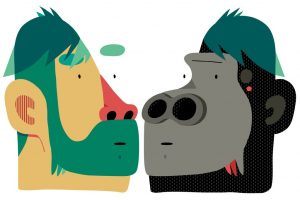Natalie Angier in The New York Times:
 In advance of Father’s Day, let’s take a moment to sort out the differences and similarities between “Dad jeans” and “Dad genes.” Dad jeans are articles of sex-specific leisure clothing, long mocked for being comfy, dumpy and elastic-waisted but lately reinvented as a fashion trend, suitable for male bodies of all shapes and ages. Dad genes are particles on the sex-specific Y chromosome, long mocked for being a stunted clump of mostly useless nucleic waste but lately revealed as man’s fastest friend, essential to the health of male bodies and brains no matter the age. Yes, dear fathers and others born with the appurtenances generally designated male. We live in exciting times, and that includes novel insights into the sole chromosomal distinction between you and the women now prowling the aisles at the hardware store. (“Didn’t he say he could use a new bow saw? Or some halogen light bulbs?”)
In advance of Father’s Day, let’s take a moment to sort out the differences and similarities between “Dad jeans” and “Dad genes.” Dad jeans are articles of sex-specific leisure clothing, long mocked for being comfy, dumpy and elastic-waisted but lately reinvented as a fashion trend, suitable for male bodies of all shapes and ages. Dad genes are particles on the sex-specific Y chromosome, long mocked for being a stunted clump of mostly useless nucleic waste but lately revealed as man’s fastest friend, essential to the health of male bodies and brains no matter the age. Yes, dear fathers and others born with the appurtenances generally designated male. We live in exciting times, and that includes novel insights into the sole chromosomal distinction between you and the women now prowling the aisles at the hardware store. (“Didn’t he say he could use a new bow saw? Or some halogen light bulbs?”)
Researchers have discovered that, contrary to longstanding assumptions, the Y chromosome is not limited to a handful of masculine tasks, like specifying male body parts in a developing embryo or replenishing the sperm supply in an adult man. New evidence indicates that the Y chromosome participates in an array of essential, general-interest tasks in men, like stanching cancerous growth, keeping arteries clear and blocking the buildup of amyloid plaque in the brain. As a sizable percentage of men age, their blood and other body cells begin to spontaneously jettison copies of the Y chromosome, sometimes quickly, sometimes slowly. That unfortunate act of chromosomal decluttering appears to put the men at a heightened risk of Alzheimer’s disease, leukemia and other disorders. “I’m quite certain,” said Lars Forsberg, an associate professor of medical genetics at Uppsala University in Sweden, “that the loss of the Y chromosome with age explains a very large proportion of the increased mortality in men, compared to women.”
Other researchers are tracing the evolution of the Y chromosome and comparing the version found in modern men with those of our close relatives, both living and extinct.
More here.
